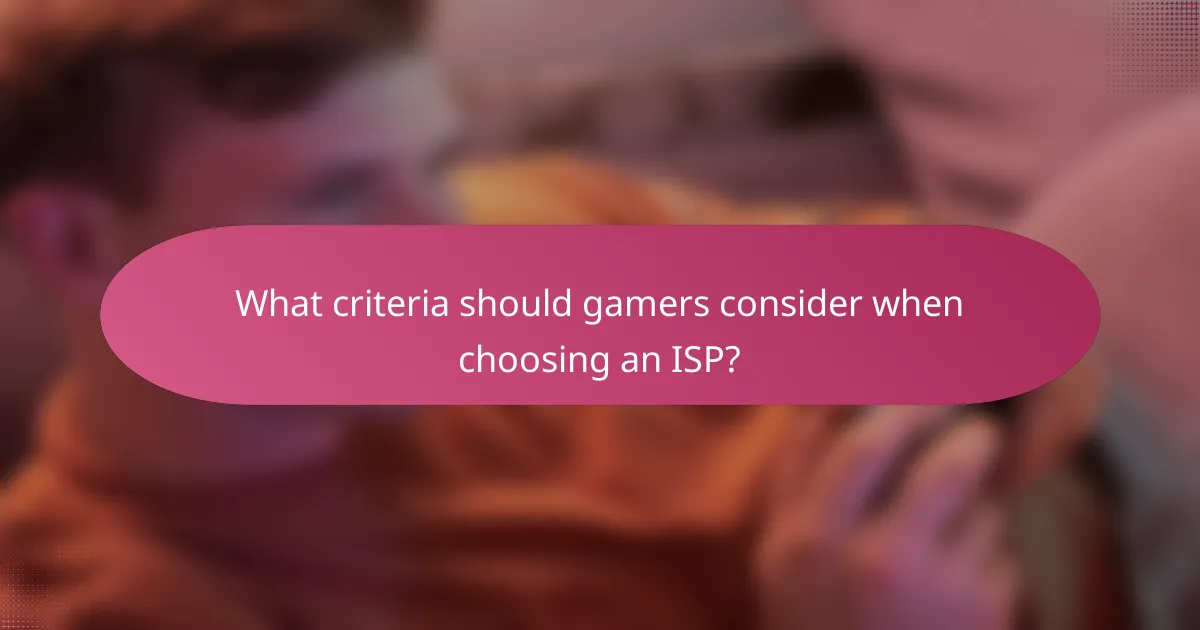Stable internet is essential for competitive gaming, particularly in North America, as it significantly influences player performance and overall gaming experience. A reliable connection minimizes delays and disruptions, enabling gamers to excel in high-stakes environments. To achieve optimal multiplayer performance, players can utilize advanced internet options like fiber-optic, cable, and 5G, while also implementing strategies to enhance their connection stability.

How does stable internet impact competitive gaming in North America?
Stable internet is crucial for competitive gaming in North America as it directly affects players’ performance and overall experience. Reliable connections reduce delays, enhance gameplay, and minimize disruptions, allowing gamers to perform at their best.
Reduced latency improves reaction times
Lower latency, often measured in milliseconds, is essential for competitive gaming. A stable internet connection can achieve latency in the low tens of ms, which significantly enhances a player’s ability to react quickly during gameplay. This is particularly important in fast-paced games where split-second decisions can determine the outcome of a match.
Players should aim for a latency below 30 ms for optimal performance. High latency can lead to frustrating delays, making it difficult to execute strategies effectively. Regularly testing your connection can help identify and address latency issues.
Consistent bandwidth enhances gameplay experience
Consistent bandwidth ensures that players have a smooth and uninterrupted gaming experience. For competitive gaming, a minimum bandwidth of 3-6 Mbps upload speed is often recommended, depending on the game. This allows for stable connections, reducing the likelihood of lag during critical moments.
It’s important to manage bandwidth usage by limiting other devices on the network while gaming. Streaming videos or downloading large files can consume bandwidth, leading to a subpar gaming experience. Consider using a wired connection for more reliable speeds compared to Wi-Fi.
Lower packet loss prevents game interruptions
Packet loss occurs when data packets traveling over the internet fail to reach their destination, which can disrupt gameplay. A stable internet connection should aim for packet loss rates of less than 1%. Higher rates can lead to choppy gameplay and frustrating disconnections.
To minimize packet loss, players should ensure their network equipment is up to date and properly configured. Regularly rebooting the router and checking for firmware updates can help maintain a stable connection. Additionally, using Quality of Service (QoS) settings can prioritize gaming traffic over other internet activities.

What are the best internet options for multiplayer gaming?
The best internet options for multiplayer gaming include fiber-optic, cable, and 5G technologies. Each of these provides distinct advantages in terms of speed, reliability, and latency, which are crucial for competitive play.
Fiber-optic internet offers superior speed
Fiber-optic internet is known for its exceptional speed, often reaching up to 1 Gbps or more. This high bandwidth allows for seamless gameplay, even with multiple devices connected simultaneously.
When considering fiber-optic options, look for providers that offer symmetrical upload and download speeds. This is particularly beneficial for activities like streaming gameplay or video conferencing while gaming.
Cable internet provides reliable performance
Cable internet is a popular choice for gamers due to its consistent performance and widespread availability. Speeds typically range from 25 Mbps to 1 Gbps, making it suitable for most gaming needs.
However, cable internet can experience slowdowns during peak usage times. To mitigate this, consider subscribing to a plan that offers higher speeds or check for providers that use advanced technologies to enhance performance.
5G technology enables low-latency connections
5G technology offers low-latency connections, which are essential for competitive gaming. With latency often below 20 milliseconds, 5G can provide a responsive gaming experience comparable to wired connections.
While 5G is still being rolled out in many areas, it can be a great option for gamers on the go. Ensure that your device is compatible and check local coverage maps to confirm availability in your region.

How can gamers optimize their internet connection?
Gamers can optimize their internet connection by using wired connections, prioritizing gaming traffic, and limiting background applications. These strategies enhance stability and reduce latency, which are crucial for competitive play and multiplayer performance.
Use wired connections for stability
Wired connections, such as Ethernet, provide a more stable and reliable internet experience compared to Wi-Fi. This is because wired connections are less susceptible to interference and signal loss, which can cause lag during gameplay.
When setting up a wired connection, ensure that your Ethernet cable is of good quality, preferably Cat 5e or higher, to support faster speeds and lower latency. Connecting directly to your router or modem minimizes potential disruptions caused by additional devices.
Prioritize gaming traffic with QoS settings
Quality of Service (QoS) settings on your router allow you to prioritize gaming traffic over other types of internet usage. By adjusting these settings, you can ensure that your gaming data is transmitted first, reducing lag and improving overall performance.
To set up QoS, access your router’s configuration page and look for the QoS settings. You can often prioritize devices or specific applications, ensuring that your gaming console or PC receives the necessary bandwidth during play sessions.
Limit background applications during play
Background applications can consume bandwidth and processing power, negatively impacting your gaming experience. Closing unnecessary programs, especially those that use the internet, can help maintain a smoother connection while gaming.
Common culprits include streaming services, file downloads, and automatic updates. Before starting a gaming session, check your task manager or activity monitor to identify and close these applications, ensuring that your system is dedicated to gaming performance.

What are the effects of internet instability on multiplayer performance?
Internet instability can severely impact multiplayer performance by causing lag, disconnections, and a reduced competitive edge. These issues can frustrate players and diminish the overall gaming experience, especially in competitive environments.
Increased lag disrupts gameplay
Lag occurs when there is a delay between a player’s action and the game’s response, often due to unstable internet connections. This delay can range from low tens of milliseconds to several seconds, significantly affecting timing-sensitive gameplay. For instance, in fast-paced shooters, even a slight lag can lead to missed shots or delayed reactions.
Players may experience choppy movements or delayed commands, making it difficult to execute strategies effectively. To minimize lag, players should consider using wired connections instead of Wi-Fi and choose servers that are geographically closer to their location.
Frequent disconnections lead to frustration
Frequent disconnections can interrupt gameplay and lead to a frustrating experience for players. These interruptions can last from a few seconds to several minutes, resulting in lost progress or penalties in competitive matches. Players often find themselves unable to reconnect quickly, which can be particularly aggravating during crucial game moments.
To mitigate disconnections, players should regularly check their internet speed and stability, ensuring they meet the recommended requirements for their games. Using a reliable internet service provider and monitoring network traffic can also help maintain a stable connection.
Reduced competitive edge in online matches
Internet instability can diminish a player’s competitive edge in online matches by hindering their ability to perform consistently. Players with stable connections can react faster and execute strategies more effectively, while those facing instability may struggle to keep up. This disparity can lead to significant differences in match outcomes.
To enhance competitive performance, players should prioritize a stable internet connection, ideally with low latency and high bandwidth. Investing in quality networking equipment and optimizing settings can provide a more reliable gaming experience, allowing players to compete at their best.

What criteria should gamers consider when choosing an ISP?
Gamers should prioritize low latency and high-speed connections when selecting an Internet Service Provider (ISP). These factors significantly influence online gaming performance, affecting everything from response times to overall gameplay experience.
Check for low latency and high speed
Low latency, measured in milliseconds (ms), is crucial for competitive gaming, as it determines how quickly your actions are registered in the game. Aim for latency under 30 ms for optimal performance, especially in fast-paced games. High-speed connections, typically above 25 Mbps for downloads and 5 Mbps for uploads, ensure smooth gameplay without lag.
When evaluating speed, consider both download and upload rates. While download speed is often emphasized, upload speed is equally important for activities like streaming or sharing gameplay. Use online speed tests to assess your current connection and compare it with potential ISPs.
Evaluate customer service and reliability
Reliable customer service can make a significant difference when issues arise with your internet connection. Look for ISPs that offer 24/7 support and have a reputation for resolving problems quickly. Reading customer reviews can provide insight into the quality of service and responsiveness.
Additionally, consider the ISP’s reliability in your area. Research their service uptime and any historical outages. A provider with consistent performance and minimal downtime will enhance your gaming experience, allowing you to focus on gameplay rather than connectivity issues.
